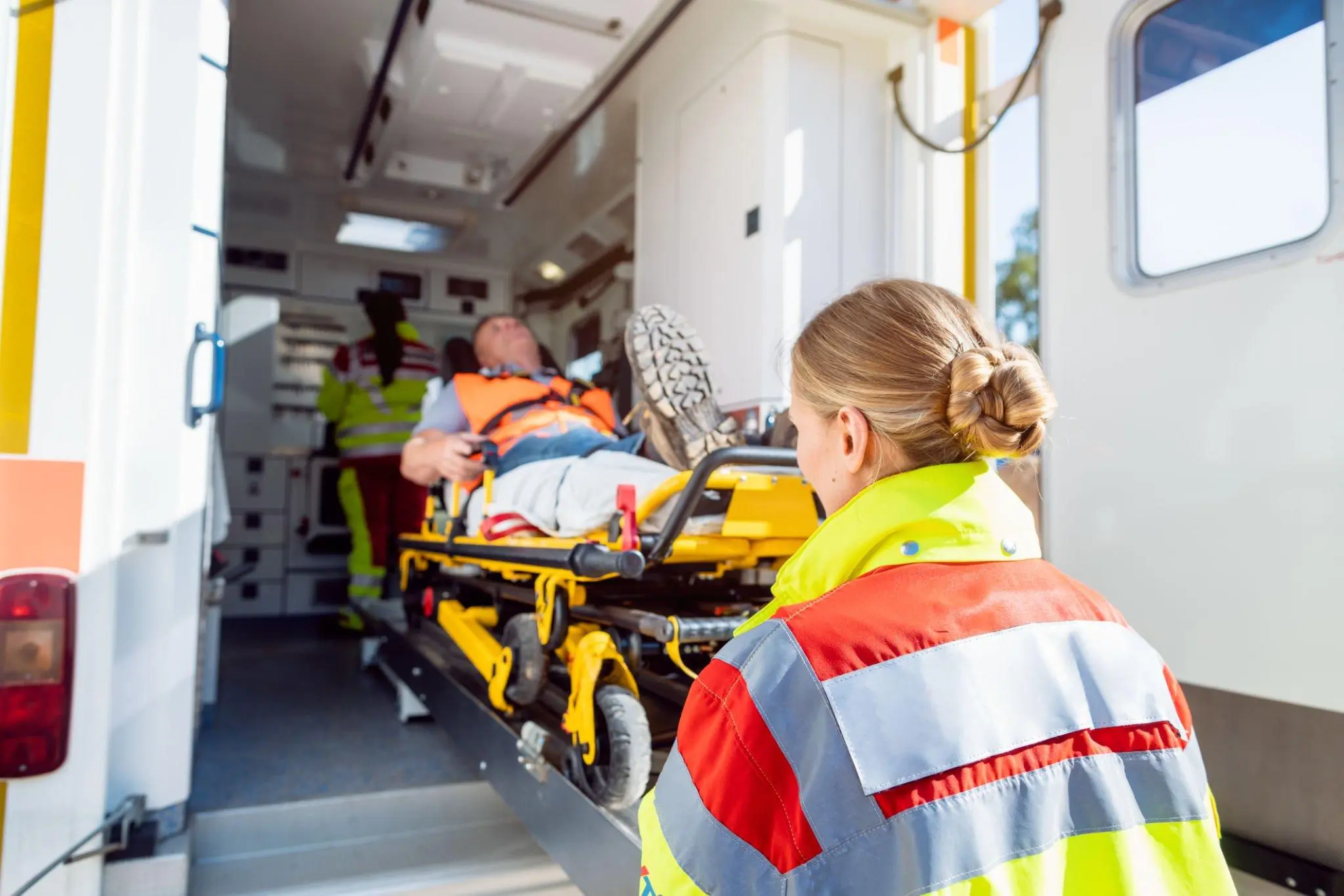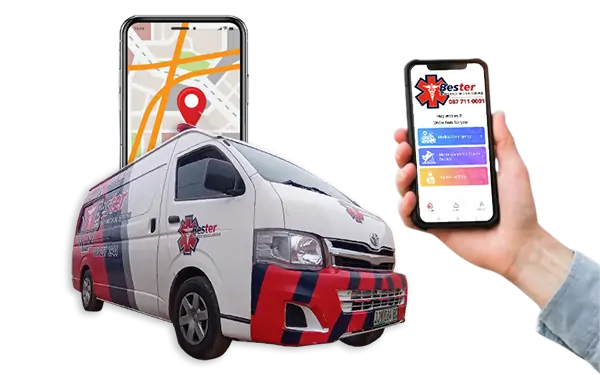The Future is Mobile: Emerging Technologies and the Next Generation of Mobile EMS Apps

The world of EMS Services is undergoing a major change brought on by the fast development of mobile technology. The importance of smart phones and tablets, which are being used more and more, to Emergency Services has been realized by providers. In Port Elizabeth, South Africa, EMS Services in Port Elizabeth have taken a lead in this transition by adopting advanced EMS Mobile Applications to enhance how they deliver their services with regards to efficiency, effectiveness as well as quality in relation to Ambulance Services.
THE EVOLUTION OF EMS SERVICES AND RISE OF MOBILE TECHNOLOGY
In the old days, radio communication and paper-based documentation were the mainstay for coordinating and delivering care in EMS Services. However, these methods are not without limitations such as late communication, possibility of errors and absence of critical information on a patient. The advent of mobile technology has opened up new frontiers for Emergency Services by allowing real-time communication, data sharing and improved decision-making capabilities.
IMPACT OF SMARTPHONES AND TABLETS ON EMERGENCY SERVICES
The use of smartphones and tablets has revolutionized EMS Services. These gadgets offer numerous advantages over traditional ways:
- Connection: Smartphones and tablets allow EMS Services in Port Elizabeth to remain connected with dispatch, hospitals among other health care providers enabling seamless communication as well as coordination.
- Data accessibility: Critical patient information including medical history, allergies or medications can be accessed instantly through mobile devices used by Ambulance Services hence they are better placed to make informed choices.
- GPS capabilities: Inbuilt GPS feature allows for tracking the movement of ambulances as well as other resources in order to optimize dispatch service thereby reducing response times in Emergency Services in Port Elizabeth.
- Telemedicine: Mobile devices that support EMS services are capable of linking emergency cases with experts who are located far away thus real time advice may be provided during intricate problems or dilemmas.
THE EMERGENCE OF EMS MOBILE APPS
As mobile technology has evolved so have applications meant specifically for EMS Services. The landscape of Emergency Services is being transformed through EMS Mobile Apps which offer various powerful tools plus features aimed at improving healthcare delivery. These programs aim at making work easier saving lives ultimately through streamlining workflows, enhancing communication among others.
Main Features and Advantages of EMS Mobile Applications
EMS Mobile Apps have a variety of features and benefits that are changing the way in which Emergency Services in Port Elizabeth operate. Some of the most significant benefits are:

Real-Time Data Access and Sharing
Among the most important aspects of EMS Services is the ability to access critical information on patients and share it instantly. Thus, EMS mobile applications can allow ambulance services to safely store, retrieve, and distribute data including:
- Patient demographics
- Medical histories
- Allergies as well as medications
- Vital signs plus diagnostic data
This kind of real-time data access thus enables EMS Services in Port Elizabeth to make better decisions, perform targeted treatments, and ensure continuum of care throughout entire healthcare system.
Enhanced Communication and Coordination
Successful delivery of any emergency services requires effective communication and coordination among all involved parties. Accordingly, EMS Mobile Apps enable smooth flow of information between key actors including:
- Dispatch centers
- Ambulance crews
- Hospitals (Emergency Departments)
- Other healthcare providers
Real time updates regarding patient status, resource availability and incident details can be communicated through these apps ensuring that all actors are informed enough for making appropriate responses.
Improved Navigation and Resource Allocation
Via GPS technology employed by EMS Mobile Applications, advanced navigation systems as well as resource allocation capabilities are utilized by users so that they can reach their destinations easily without getting lost or wasting much time by using Google map services in our phones today, for example.
These features include:
- Real-time traffic updates and route optimization
- Dynamic dispatching based on vehicle location and availability
- Geofencing and location-based alerts
- Integration with computer-aided dispatch (CAD) systems
By improving navigation and resource allocation, EMS Services in Port Elizabeth can reduce response times, improve resource deployment, and ultimately save more lives.

Telemedicine and Remote Support
Telemedicine is a game changer in emergency services. This means that ambulance services have access to immediate expert advice and support by using EMS mobile apps. It is worth noting that these applications have telemedicine features including:
- Video conferencing with medical specialists
- Remote monitoring of patient vital signs
- Real time transmission of diagnostic data (such as ECG, ultrasound)
- Telementoring and virtual training for EMS providers
In this way, EMS Services in Port Elizabeth can provide better care even in difficult or remote areas by engaging expertise of healthcare professionals from every corner of the world.
Beter’s EMS Mobile App: A Comprehensive Solution for Emergency Services in Port Elizabeth
Beter, the leading provider of EMS Mobile Applications designed a state-of-the-art solution specifically for EMS Services in Port Elizabeth. The region will benefit from the cutting-edge technology features found in the software favoured by the EMS service providers.
Key Features of Beter’s EMS Mobile App
- Intuitive user interface: The application is designed with an easy-to-use interface that allows users to select any needed information or tool they wish regardless of their intensity of work.
- Secure data management: Citywide ambulance operates within an environment where patient data must be secured by law; this app complies with privacy rules thus avoiding any violation.
- Seamless integration: Once installed, it can be easily linked to other systems used by the emergency departments and processes followed when providing services at such institutions can continue being maintained without significant change even though it has to now be delivered via mobile devices.
- Customizable features: The company behind this software ensures that these tools can be adapted according to specific requirements associated with EMS services offered within South Africa, especially in Port Elizabeth.
Benefits of Implementing Beter’s EMS Mobile App in Port Elizabeth
By using Beter’s EMS Mobile App, several areas will experience improvement as follows:
- Reduced response times: Real-time access to data on patients’ health situations, advanced navigation and smarter resource allocation make it possible for an ambulance to respond more promptly during emergencies.
- Improved patient outcomes: Such a system, coupled with telemedicine services and real-time data sharing may provide better healthcare to patients needing emergency service thereby reducing morbidity/mortality.
- Increased operational efficiency: This application automates the process of recording information, makes it easier for workers to handle various activities assigned to them by their supervisors as well as helps in achieving objectives of this organization within a short period of time.
- Enhanced community trust: EMS Services in Port Elizabeth can gain more trust from residents if they show commitment to practices that will constantly make them better; it is a good way of strengthening relationships between members who live here and city’s paramedics.
Implementation Challenges for EMS Mobile Applications
The advantages of EMS Mobile Apps are well-known but, there are also several considerations and challenges that must be met by EMS services in Port Elizabeth when introducing these solutions:
Infrastructure and Connectivity
To fully exploit the functionality of EMS Mobile Applications, ambulance services need access to reliable mobile networks and internet connections. In some areas, especially remote or rural locations, infrastructure limitations could hinder successful implementation of mobile solutions.
Training and Adoption
Introducing such new technologies into EMS Services requires significant investment in training and change management. Staff members of Emergency Services in Port Elizabeth have to be sure they can use EMS Mobile Applications efficiently and integrate them into their routine activities without any problem.
Data Security and Privacy
Moreover, as far as emergency medical services (EMS) data is concerned, it is essential for data security and privacy measures to be put in place before implementing EMS mobile apps on the other hand. These should include compliance with relevant regulations like Protection of Personal Information Act (POPIA), strong security mechanisms against breaches or unauthorized entry among others.
Integration with Existing Systems
For maximum returns from EMS Mobile Applications, it is vital that these solutions seamlessly blend with other existing Emergency Service systems such as dispatch software, Electronic Health Records (EHRs) or hospital information systems. Technology providers who partner with EMS Services in Port Elizabeth will work closely together to ensure seamless integration across all platforms thereby facilitating an easy flow of data.
The Future of Mobile EMS Apps and EMS Services
The EMS Mobile Apps are also bound to grow more powerful as development in mobile technology progresses. This implies that, in the next few years, we will see even more advanced features and functionalities that will revolutionize the provision of Emergency Services.
Artificial Intelligence and Machine Learning
One promising area of growth is integrating artificial intelligence (AI) and machine learning (ML) into EMS Mobile Applications. These technologies can change how Ambulance Services operate including:
- Predictive analytics: Through AI-based data processing abilities, EMS Mobile Apps could use historical data, real-time information or other externalities e.g., weather/traffic to predict probable emergencies and optimize resource allocation.
- Clinical decision support: So as to enable better diagnoses hence making right treatment choices for patients, ML algorithms can help EMS Services in Port Elizabeth.
- Natural language processing: Based on AI techniques, patient care reports could be automatically generated through an extraction of important concepts from unstructured information such as voice notes or handwritten notes thereby shortening time period taken during review processes.
Internet of Things (IoT) Integration
Another potential area is the integration of IoT devices with Emergency Services. By combining IoT devices and sensors with the capabilities of **EMS Mobile Apps, these companies like Ambulance Service Providers can have access to real-time sources like;
- Wearable devices: Individuals suffering from chronic diseases or individuals who are at risk could put on IoT wearables which keep track of their vitals signs always alerting them when there is an emergency to call EMS Services in Port Elizabeth.
- Smart vehicles: Situated in ambulances, the Internet of Things (IoT) sensors can help monitor equipment status, driving conduct and vehicle performance so that vehicles meant for Emergency Services are ever ready.
- Environmental sensors: Anytime there is a potential hazard like fire outbreak, gas leakage or air pollution then it would be enough to inform EMS Services through IoT devices deployed all over public spaces.
Augmented Reality and Virtual Reality
Augmented reality (AR) and virtual reality (VR) technologies are also poised to play a significant role in the future of EMS Mobile Applications. These tools could be used for:
- Training and simulation: VR-based training programs could provide EMS Services in Port Elizabeth with immersive, realistic scenarios to practice and refine their skills, without the risks associated with real-world emergencies.
- Remote assistance: AR-enabled Nicolas & Loris’ EMS Mobile App brings remote medical experts close to Ambulance Service Providers, enabling them to participate via interactive 3D visualization or annotation by using mobile phones.
- Patient education: For example, they can be applied in explaining complex medical procedures since they allow us to better understand how we should act during various medical situations thus providing better communication between patients/family members and Emergency Service Providers.
Conclusion
The integration of mobile technology and EMS Mobile Apps is changing the landscape of Emergency Services in Port Elizabeth and beyond. By utilizing smartphones, tablets and advanced apps like Beter’s EMS Mobile App, EMS Services in PE can improve their efficiency, effectiveness and quality of care to local population.
However, successful realization of these solutions demands careful planning, investing as well as collaboration among Ambulance Services, technological providers, government agencies and general public. Addressing such issues like infrastructure, training, data security as well as system integration will enable EMSs to exploit full potential of mobile technologies and deliver excellent Emergency services globally.
Looking towards the future it is an exciting prospect for EMS Mobile Applications. The continued improvement in AI, ML IoT AR VR etc will lead to more innovative tools that will fundamentally change how Emergency services are run. Through embracing these technologies and adapting to the new environment; EMS services in Port Elizabeth can be ahead at all times when it comes to patient care by ensuring they stay relevant for community members.